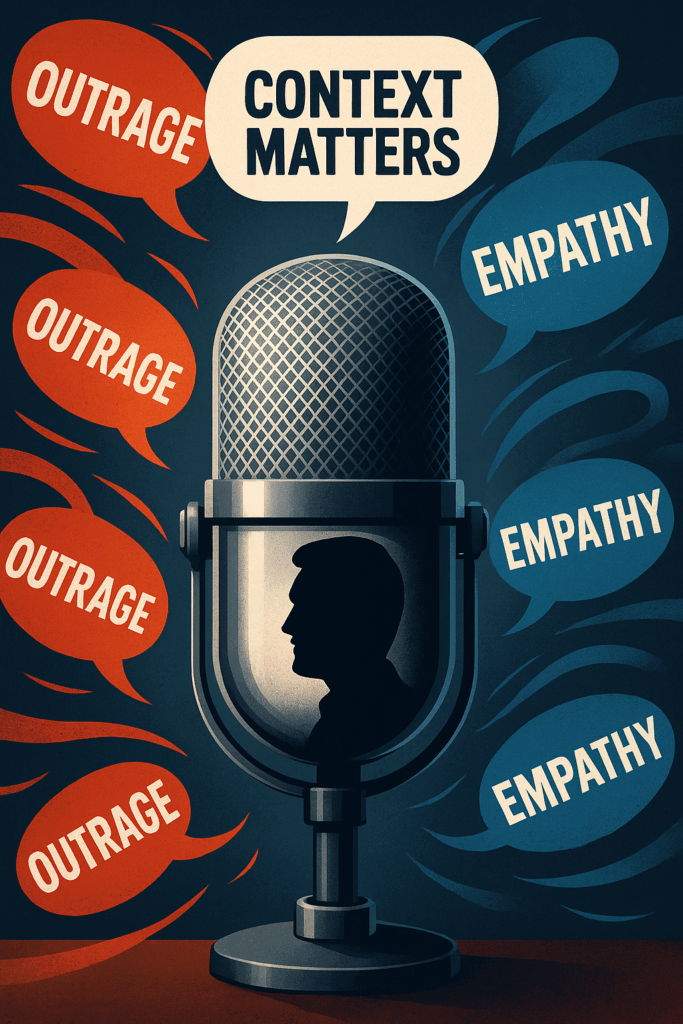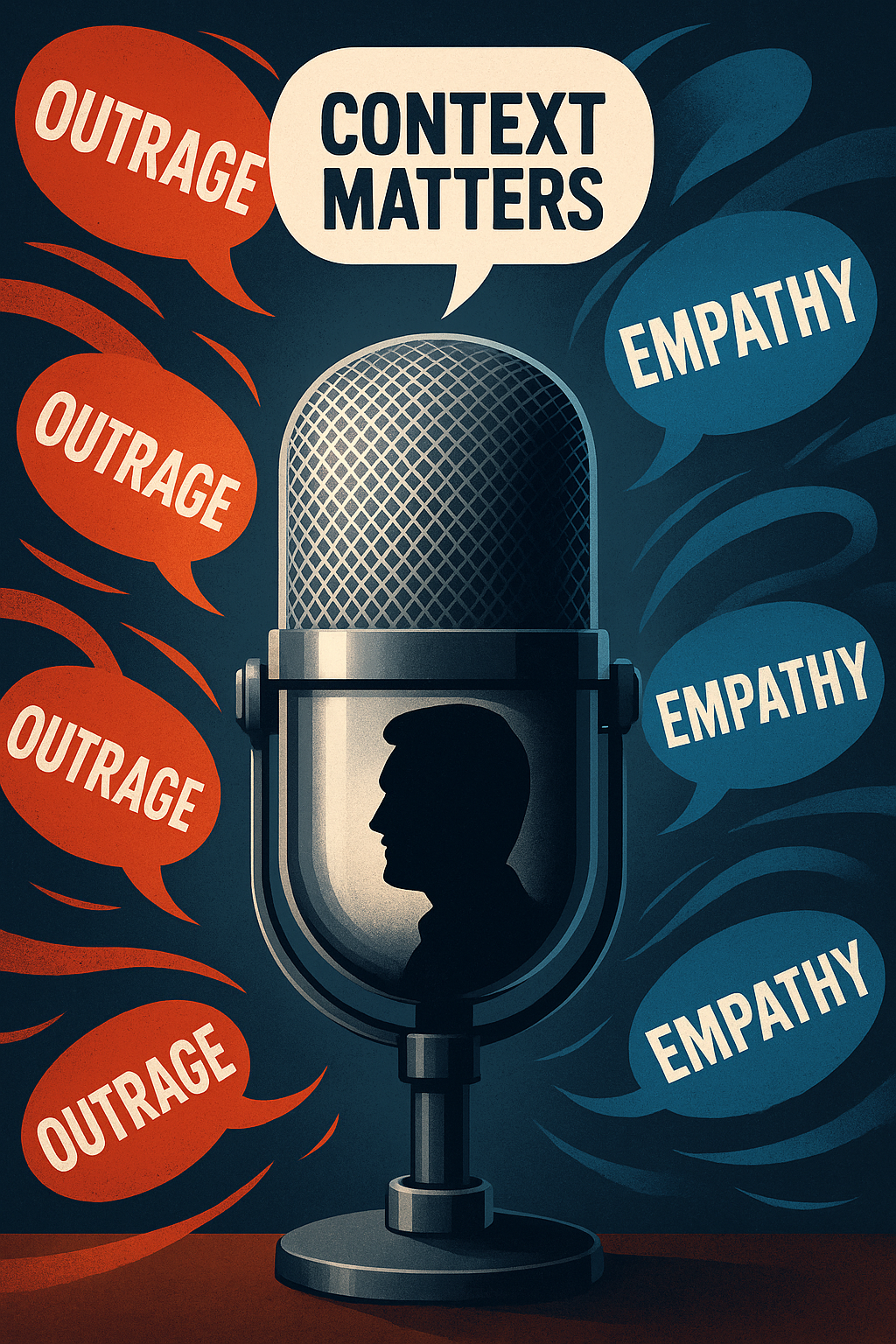Oh that darnable quote from Charlie Kirk, “I can’t stand the word empathy. Actually, I think empathy is a made up new age term… that it does a lot of damage.”
“Well that does it. He surely deserved to be shot,” said millions of people who also fight tooth and claw to save the lives of murderers and fist fight in the streets for the moral freedom of child molesters.[1]
To Charlie’s Frequent Point
We have a massive listening problem in our country. Something Charlie Kirk worked hard to overcome. We don’t listen to each other and certainly don’t listen to understand each other. Which does touch upon this quote at several points.
Get Your Facts Straight
Point #1: Get your facts straight. The quote is presented as if Kirk said, “Well, I don’t like empathy.”
I was actually shocked the other day to go on a fellow Christian’s Facebook page and find a litany of supposed quotes from conservatives meant to enrage his readers. Shocked that I’d not heard these quotes discussed. I questioned whether or not my own page’s algorithm bias simply kept that information away from me… unlikely because I track more than 20 news sites.
Even so, I decided to look several of the worst offenders up. They were all akin to this corruption. Everyone I checked was a blatant lie, often reflecting the very opposite of what the offender actually said. Kirk didn’t like the WORD empathy. This means the discussion is about labels and how those labels are used. Get your facts straight.
Context Always Matters
Point #2: Context always matters. In this instance, the whole quote helps… as does the context for making the statement in the first place. A transcript from HG Tudor in his podcast “Knowing the Narcissist” does a great summary for us. I’ll quote… forgive the length, but this is important.
“Here is what he actually said during an episode of the Charlie Kirk show on October the 12th, 2022. The new communication strategy is not to do what Bill Clinton used to do where he would say, “I feel your pain.” Instead, it is to say, “You’re actually not in pain.” …Bill Clinton in the 1990s, it was all about empathy and sympathy. I can’t stand the word empathy. Actually, I think empathy is a made-up new age term that it does a lot of damage, but it is very effective when it comes to politics. Sympathy, I prefer more than empathy. That’s a separate topic for a different time.
Kirk’s remarks were part of a broader discussion about how political messaging has evolved, specifically referencing former US President Bill Clinton’s famous, “I feel your pain” approach during his 1992 presidential campaign. Kirk contrasted that with what he perceived as a modern democratic strategy of dismissing people’s struggles rather than acknowledge them. He argued that empathy as a concept is a made-up new age term that causes harm, though he acknowledged its effectiveness in political rhetoric. Kirk expressed a preference for the term sympathy over empathy.”[2]
Listen to Understand Not Destroy
Point #3: Listen to understand rather than to destroy. I’ve spent a lot of years in the academy. The arrogant tendency of many in my cohorts was to listen to find fault. We were supposed to listen for weakness in order to help our academic compatriots improve their skills in research and writing. But let me tell you, that attitude was sometimes lacking. Certain people live to find fault. It is not a tool. It is their bread and butter, their life breath, their reason for being. In the early days of social media these folks got the name “trolls.” Today, this “troll” approach to engagement predominates. I’ll discuss why this is in our next segment of this discussion.
A troll approach here does not care about context. It does not care what Kirk meant by what he said. It looks for things to exploit for the disruption of understanding and the destruction of the speaker. For instance, I might take issue with his use of the phrase “New Age.” I might attack him for etymological misinformation. A “troll” might rush to call him an ahistorical clod for failing to incorporate the real history of the word.[3] He might even relish accusing him of slandering as New Agers both the man who coined the term in the early 1900s and the Germans who had a version of it before that.
Or… I could understand that in conversations people grab quickly at things and often blur the edges of what they say in relationship to what they mean. Am I listening to understand? Or am I listening to destroy?
Define Your Terms… and Make them Define Theirs
Point #4: Words need to be defined. Charlie Kirk usually worked hard to define terms in his bold and dangerous engagement of living “trolls.” After all, his audience was often enraged at the very idea that contrary opinions existed among men. In this instance, while talking in a podcast scenario, Charlie failed to do so, saying, “that is a discussion for another time.” Empathy vs. sympathy was off point for what he was attempting to accomplish in the moment.
Even so, his broader and massive catalogue of recorded discussion brings light. “Empathy” is used to claim that one can and should take up another’s feelings and centralize those feelings as an impetus for action on their behalf to alleviate negative feelings.
Sympathy is a Better Term… & Idea
In his context, he was hitting on, but not exploring, the myopic application of empathy for certain people while denying the need for empathy for others. The “I feel your pain” claims of Clinton has all but disappeared in relationship to those the left have deemed “oppressors.”
We centralize the pain of the boy who thinks he’s a girl as all important but deny the pain of the girls forced to change and shower with that boy as we “validate” his feelings of “girlness.”
We centralize the pain of women who are pregnant and don’t want to be, but deny the pain of those children that we murder and dismiss the pain of fathers and the damage that allowing abortion does to a civilization in order to ease and “validate” the negative feelings of the mother.
For Useful Idiots (The left’s term not mine) this “empathy” is real and myopic. For their puppeteers, this “empathy” is a tool of manipulation designed to obtain total power. They would rather rule and reign over a burning garbage dump than be common in a human paradise.
Charlie Kirk favored understanding other people’s pain and frustration and joy and desire, understanding the strength that it has in their lives, hence his preference for the WORD sympathy. But he never favored allowing those feelings to override truth, reality, or goodness. To love is to seek someone else’s good in reality rather than in some self-flattering virtue signaling that merely makes others feel “validated in their feelings.”
Tune in next time as I continue to explore the application of “empathy” as a political weapon to manipulate the masses and decentralize truth.
~Andrew D. Sargent, PhD
[1] Of course, these are also those people who thought it was a shame that Trump’s sniper missed, indignant that the “right” would vote for “a felon and rapist,” all while casting votes in numerous elections for both of the Clintons, Obama, and Biden. And if you don’t know why that tips the irony scales, may I suggest that you get better news sources and do your homework a little more carefully.
[2] HG Tudor, Knowing the Narcissist: Ultra, “Charlie Kirk: Public Reaction “I Think Empathy Is a Made-up, New Age Term,” https://www.youtube.com/watch?v=A9tLU28uvjY.
[3] The English word empathy was coined around 1908 by psychologist Edward Titchener, translating the German Einfühlung (“feeling into”), a term introduced in the 1870s by Robert Vischer and developed by Theodor Lipps to describe the act of emotionally projecting oneself into a work of art or another person’s experience. Though built from the Greek roots en (“in”) and pathos (“feeling, suffering”), the ancient Greeks never used these together to express this idea. Their similar term empátheia (ἐμπάθεια) actually meant emotional excess or passion—something negative that philosophers like the Stoics sought to overcome. Thus, while empathy draws on Greek etymology, its modern sense of compassionate emotional understanding is a distinctly modern invention of late-19th- and early-20th-century psychology.

Discover more from Biblical Literacy with Dr. Andrew D. Sargent
Subscribe to get the latest posts sent to your email.



[…] 18). Empathy, the Christian, and Charlie Kirk (Part 1: Context matters). Dr. Andrew Sargent. https://drandrewsargent.com/2025/10/empathy-the-christian-and-charlie-kirk-part-1-context-matters/Speri, A. (2025, September 13). How Charlie Kirk turned campuses into cultural battlefields – and. […]